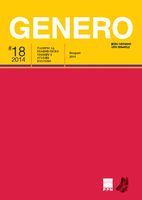Koncepti maskuliniteta i politike prajda u Srbiji
Concepts of Masculinity and the Politics of Pride in Serbia
Author(s): Marko VeličkovićSubject(s): Gender Studies
Published by: Centar za ženske studije & Centar za studije roda i politike, Fakultet političkih nauka, Beograd
Keywords: masculinity; gender; politics; Pride; feminism; subversion
Summary/Abstract: The paper examines possibilities of the politics of Pride in Serbia to question ‘natural’ interest of heterosexual men to defend the homophobic gender order. Seen as an inherent part of masculine identity, this interest does not exist beyond the male gender role. Homophobia refl ects male loyalty to their gender. However, many men are exposed to gender repression. Revealing repressiveness of male gender role has subversive potential, which has not been recognized within the politics of Pride in Serbia. Masculinities, as diff erent models of male bonds to their gender, are important factors in establishing extent of (un)livable forms of existence. Defi ning feminism as a movement to end sexism, sexist exploitation and oppression, bell hooks argues that feminism gives men opportunity for liberation from the constraints of patriarchy. Th ere is a wide range of feminist theories and actions pointing to diff erent forms of gender representations which conceal gender repression as culturally invisible. Nevertheless, feminist critique and problematization of gender relations has not been translated into public campaigns of Pride initiatives in Serbia. Th eir activities are aimed to create political will within the existing system of gender power, rather than to undermine gender framed homophobic culture in society. In order to contribute to the development of Pride policies, this paper analyzes engagement of such politics in problematizing diff erent masculine models in Serbia. Pride initiatives have more access to media and public sphere than the feminist movement has ever had. They should take advantage of that position and assert the issue of gender oppression as relevant within political and public debates. One of the basic goals of that debate is to confront heterosexual men in Serbia with the price they pay for being loyal to their homophobic gender roles and preserving the system which restricts their own life opportunities.
Journal: Genero: časopis za feminističku teoriju i studije kulture
- Issue Year: 2014
- Issue No: 18
- Page Range: 155-186
- Page Count: 32
- Language: Serbian

